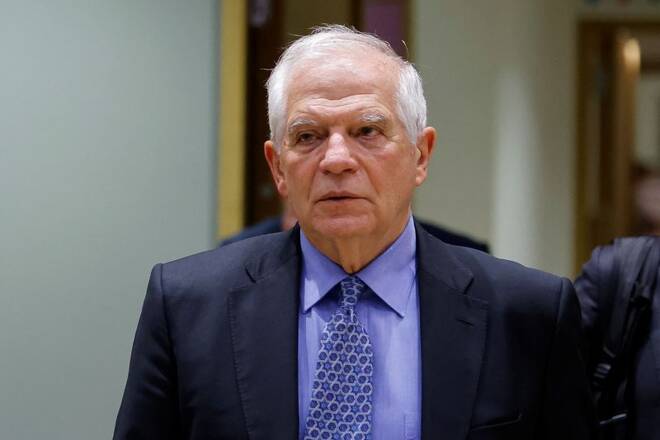Advertisement
Advertisement
EU seals plan to send a million artillery shells to Ukraine
By:
By Andrew Gray and Sabine Siebold BRUSSELS (Reuters) - European Union countries agreed on Monday on a plan to give 1 million artillery shells to Ukraine over the next year by digging into their own stockpiles and teaming up to buy more, officials said.
By Andrew Gray and Sabine Siebold
BRUSSELS (Reuters) -European Union countries on Monday agreed a 2 billion euro plan to send 1 million artillery rounds to Ukraine over the next year by digging into their own stockpiles and teaming up to buy more shells.
“We have reached a political consensus to send to Ukraine one million rounds of 155 mm calibre ammunition,” Estonian Defence Minister Hanno Pevkur told reporters on the sidelines of a meeting of EU foreign and defence ministers in Brussels.
“There are many, many details still to (be) solved but for me, it is most important that we conclude these negotiations and it shows me one thing: If there is a will, there is a way,” said Pevkur, whose country had championed the move.
The plan approved by the ministers was based on a proposal from EU foreign policy chief Josep Borell to spend 1 billion euros ($1.07 billion) on shells from stockpiles to get more supplies to Kyiv soon, and 1 billion more on joint procurement.
The joint procurement will be limited to companies from the EU and Norway, which has close economic ties to the bloc.
Some EU governments wanted the initiative to be open to a broader market, arguing this would help get munitions more quickly to Ukraine. But others said EU money should go to EU companies and insisted they would have capacity to meet demand.
As part of the initiative, a group of 17 EU members plus Norway signed a document known as a project arrangement, setting out the terms of a joint endeavour to swiftly buy 155 mm ammunition and a longer-term program to buy other ammunition.
Such a move marks a significant step in EU integration as defence procurement in the European Union has largely been in the hands of individual member governments until now.
The new joint procurement effort will be led by the EU’s European Defence Agency, which said the common approach was “the best option to achieve cost reduction from economies of scale”.
‘HISTORIC’ MOVE
Borrell hailed the ministers’ approval of the plan as a “historic decision”.
Ukraine has identified the supply of 155 mm shells as a critical need as it engages in a fierce war of attrition with invading Russian forces. Both sides are firing thousands of artillery rounds every day.
Ukrainian and Western leaders have warned in recent weeks that Kyiv is burning through the shells more quickly than its allies can provide them, leading to a renewed push to send supplies and find ways to ramp up production.
The 2 billion euros for the plan will come from the European Peace Facility, an EU-run fund that partially reimburses EU member countries for military aid. So far it has paid out some 3.6 billion euros for munitions and other items for Ukraine.
German Defence Minister Boris Pistorius, whose country is taking part in the joint procurement initiative, described it as “new territory” for the EU.
He said Germany would also open its national framework contracts with the defence industry to other partners as speed was of the essence.
“Our goal has to be to ship a significant amount of munitions to Ukraine before the end of this year,” he said.
($1 = 0.9330 euros)
(Reporting by Andrew Gray; Editing by Kevin Liffey and Christina Fincher)
About the Author
Reuterscontributor
Reuters, the news and media division of Thomson Reuters, is the world’s largest international multimedia news provider reaching more than one billion people every day. Reuters provides trusted business, financial, national, and international news to professionals via Thomson Reuters desktops, the world's media organizations, and directly to consumers at Reuters.com and via Reuters TV. Learn more about Thomson Reuters products:
Advertisement
